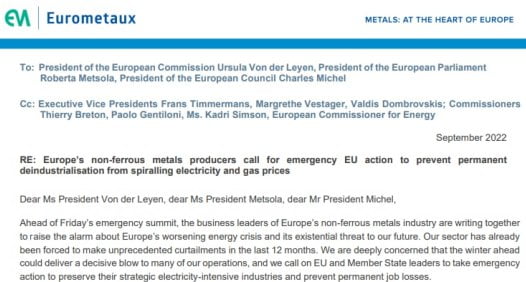This month 40 CEOs of European metal producers have just warned of an “existential threat” to the industry in an open letter addressed to President of the European Commission Ursula Von der Leyen our President of the European Parliament Roberta Metsola President of the European Council Charles Michel with Executive Vice Presidents Frans Timmermans Margrethe Vestager Valdis Dombrovskis Commissioners Thierry Breton Paolo Gentiloni Ms Kadri Simson European Commissioner for Energy in copy.
The letter entitled “Europe’s non-ferrous metals producers call for emergency EU action to prevent permanent deindustrialisation from spiralling electricity and gas prices” was not only signed by the Director General of Eurometaux (the European Association of Metals) Guy Thiran and the President of the same association Mikael Staffas but also by business leaders of Europe’s non-ferrous metals industry.
Since the letter is too long I will be dividing it into two blogs but it can also be read in the following document:
https://eurometaux.eu/media/qnhn5k30/non-ferrous-metals-ceo-letter-on-energy-crisis-06-09-2022.pdf
“Ahead of Friday’s emergency summit the business leaders of Europe’s non-ferrous metals industry are writing together to raise the alarm about Europe’s worsening energy crisis and its existential threat to our future. Our sector has already been forced to make unprecedented curtailments in the last 12 months. We are deeply concerned that the winter ahead could deliver a decisive blow to many of our operations and we call on EU and Member State leaders to take emergency action to preserve their strategic electricity-intensive industries and prevent permanent job losses.
50% of the EU’s aluminium and zinc capacity has already been forced offline due to the power crisis as well as significant curtailments in silicon and ferroalloys production and further impacts felt across copper and nickel sectors.
In the last month several companies have had to announce indefinite closures and many more are on the brink ahead of a life-or-death winter for many operations. Producers face electricity and gas costs over ten times higher than last year far exceeding the sales price for their products. We know from experience that once a plant is closed it very often becomes a permanent situation as re-opening implies significant uncertainty and cost.
Europe’s clean energy goals require a competitive and growing metals sector to ensure a secure supply of the extra raw materials needed to shift away from fossil fuels. Base metals battery metals and other metals are all needed in higher volumes for Europe’s grid infrastructure electric vehicles solar panels wind turbines and hydrogen electrolysers as well as a complex web of other essential value chains across the European economy. We actively support your drive to improve Europe’s strategic autonomy for its energy transition and we want to make the long-term investments needed into advancing and expanding our operations ready for 2050. But all metals production needs affordable and available electricity and gas whether aluminium and zinc today or lithium and cobalt tomorrow.
We are deeply concerned that Europe faces a critical situation for the foreseeable future with a perfect storm of sky-high electricity prices no energy market liquidity due to insecure gas supplies a continued nuclear and coal-phase out and the remaining power sources being insufficient to cover market needs.
Europe cannot have a successful energy and raw materials strategy if its power and gas prices stay at today’s levels for a sustained period without relief.The long-term investment climate for all EU strategic metals operations and projects risks being decimated and more closures will follow next year once companies are not protected by their 2022 hedging of the electricity price. Any further EU production loss will also increase global greenhouse gas emissions due to replacement supply from more polluting regions.[1]”
[1]Many metals are now imported from China and elsewhere. Chinese production is 2 5 times more carbon intensive than European zinc production; 3 more in the case of aluminium and 3 8 more for silicon. We estimate that Europe’s replacement imports of aluminium have already added 6-12 million tonnes of CO2 this year.

